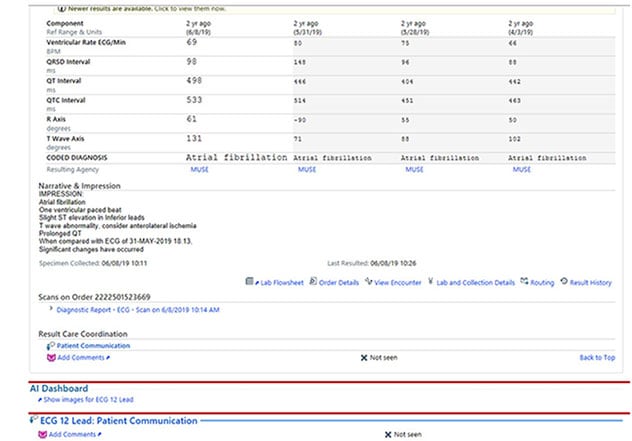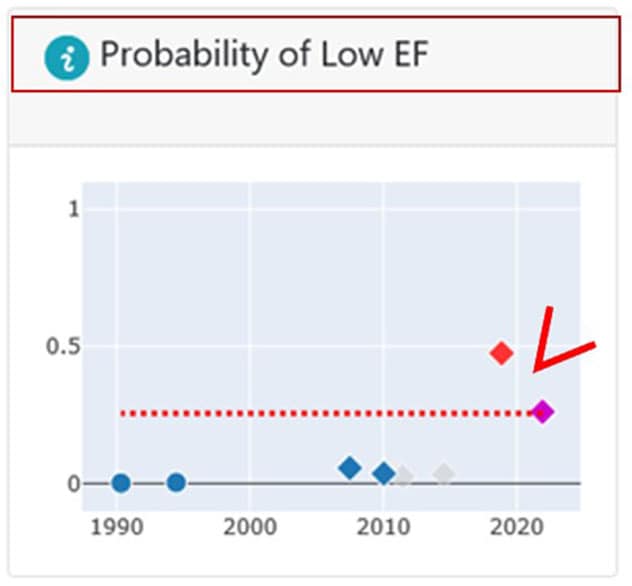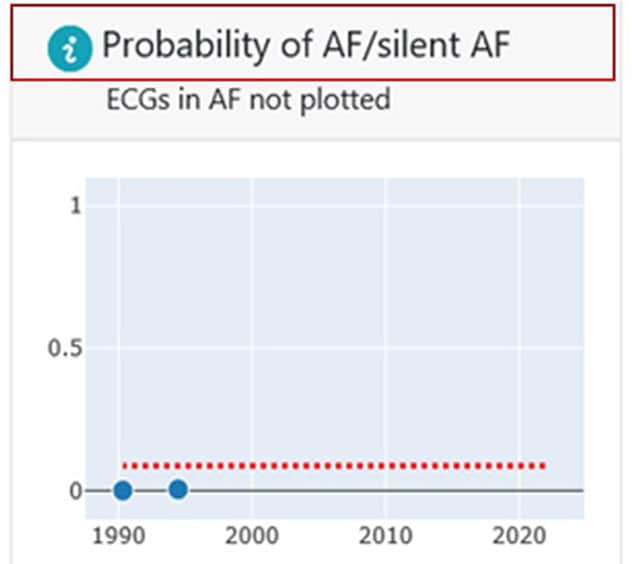Jan. 14, 2022
The association of hyperthyroidism with atrial fibrillation (AF) and heart failure is widely recognized. Both conditions result in increased morbidity and mortality. To understand whether patients with Graves' disease who are at very high risk for these conditions can be identified, a team of cardiologists and endocrinologists at Mayo Clinic's campus in Rochester, Minnesota, evaluated a large cohort of patients with Graves' disease in medical records going back more than a decade.
Herramienta electrocardiograma por inteligencia artificial en expedientes médicos electrónicos

Herramienta electrocardiograma por inteligencia artificial en expedientes médicos electrónicos
La herramienta electrocardiograma por inteligencia artificial ya está incorporada al expediente médico electrónico y se puede acceder a ella seleccionando la opción ECG (electrocardiograma) en Epic. En el informe, hay una sección para el panel de inteligencia artificial (resaltada con el rectángulo rojo).
Probabilidad de fracción de eyección baja

Probabilidad de fracción de eyección baja
La herramienta electrocardiograma por inteligencia artificial da una probabilidad entre 0 (o 0 %) y 1 (o 100 %) para cada electrocardiograma (eje Y) utilizado en este estudio. En el caso de este paciente, la probabilidad de una fracción de eyección baja era baja al principio, pero aumentó en los dos últimos electrocardiogramas (últimos dos puntos, punta de la flecha). Esto predijo el desarrollo de una fracción de eyección baja (<50 %), que se detectó en el electrocardiograma un año después. La línea horizontal roja punteada es un valor de corte alternativo, que depende de la edad y el sexo, proporcionado por la herramienta electrocardiograma por inteligencia artificial que indica un valor binario (positivo o negativo) para el riesgo de desarrollar el resultado.
Probabilidad de fibrilación auricular y fibrilación auricular silenciosa

Probabilidad de fibrilación auricular y fibrilación auricular silenciosa
La herramienta electrocardiograma por inteligencia artificial da una probabilidad entre 0 (o 0 %) y 1 (o 100 %) para cada electrocardiograma (eje Y) utilizado en este estudio. La probabilidad de que el paciente sufra fibrilación auricular y fibrilación auricular silenciosa era de 0. La línea horizontal roja punteada es un valor de corte alternativo, que depende de la edad y el sexo, proporcionado por la herramienta electrocardiograma por inteligencia artificial que indica un valor binario (positivo o negativo) para el riesgo de desarrollar el resultado.
"It is clinically pertinent to identify the subset of patients with Graves' disease at increased risk of developing AF and heart failure who may benefit from closer surveillance and prompt restoration of euthyroidism" says Jwan A. Naser, M.B.B.S., a resident with Internal Medicine and Cardiovascular Medicine. "We found that, in a large population undergoing clinically indicated electrocardiograms (ECGs), artificial intelligence (AI)-enabled ECGs using a convolutional neural network identified the signature of silent AF in ECGs obtained while patients were in sinus rhythm. The signature of low ejection fraction also was identified for each ECG performed, with areas under the curve for silent AF and low ejection fraction of 0.87 and 0.93, respectively. This AI-enhanced ECG is now available in the electronic medical record at Mayo Clinic and gives a probability number between 0 and 1 for having silent AF and low ejection fraction."
Marius N. Stan, M.D., Endocrinology, Diabetes and Metabolism, at Mayo Clinic in Minnesota notes, "We applied this AI ECG tool to more than 400 patients diagnosed with Graves' disease over the past decade at Mayo Clinic who had ECGs around the time of diagnosis. We found that the AI ECG-derived probabilities of silent AF and low ejection fraction was an independent risk factor for the development of incident AF and heart failure with reduced ejection fraction (HFrEF), respectively."
"We also found that multivariate models that included the AI ECG in addition to conventional risk factors for AF and HFrEF in hyperthyroidism — including older age, overt hyperthyroidism, and comorbidities — significantly improved the predictive ability of the AI ECG tool. We are currently planning to build a risk score tool to identify patients at highest risk of AF and HFrEF," says Sorin V. Pislaru, M.D., Ph.D., Cardiovascular Medicine, at Mayo Clinic in Minnesota.
"This project is an excellent example of how different specialities can collaborate through the harnessing of technological advances for the sake of better patient care," concludes Grace Lin, M.D., M.B.A., Cardiovascular Medicine, at Mayo Clinic in Minnesota. Study outcomes were published in the Journal of the American College of Cardiology and the European Journal of Heart Failure in 2021.
For more information
Naser J, et al. Artificial intelligence helps identify patients with Graves' disease at risk for atrial fibrillation. Journal of the American College of Cardiology. 2021;77:319.
Naser JA, et al. Role of artificial intelligence in identifying patients with Graves' disease at high risk for heart failure with low ejection fraction. European Journal of Heart Failure. 2021;23(suppl S2):61.
Refer a patient to Mayo Clinic.